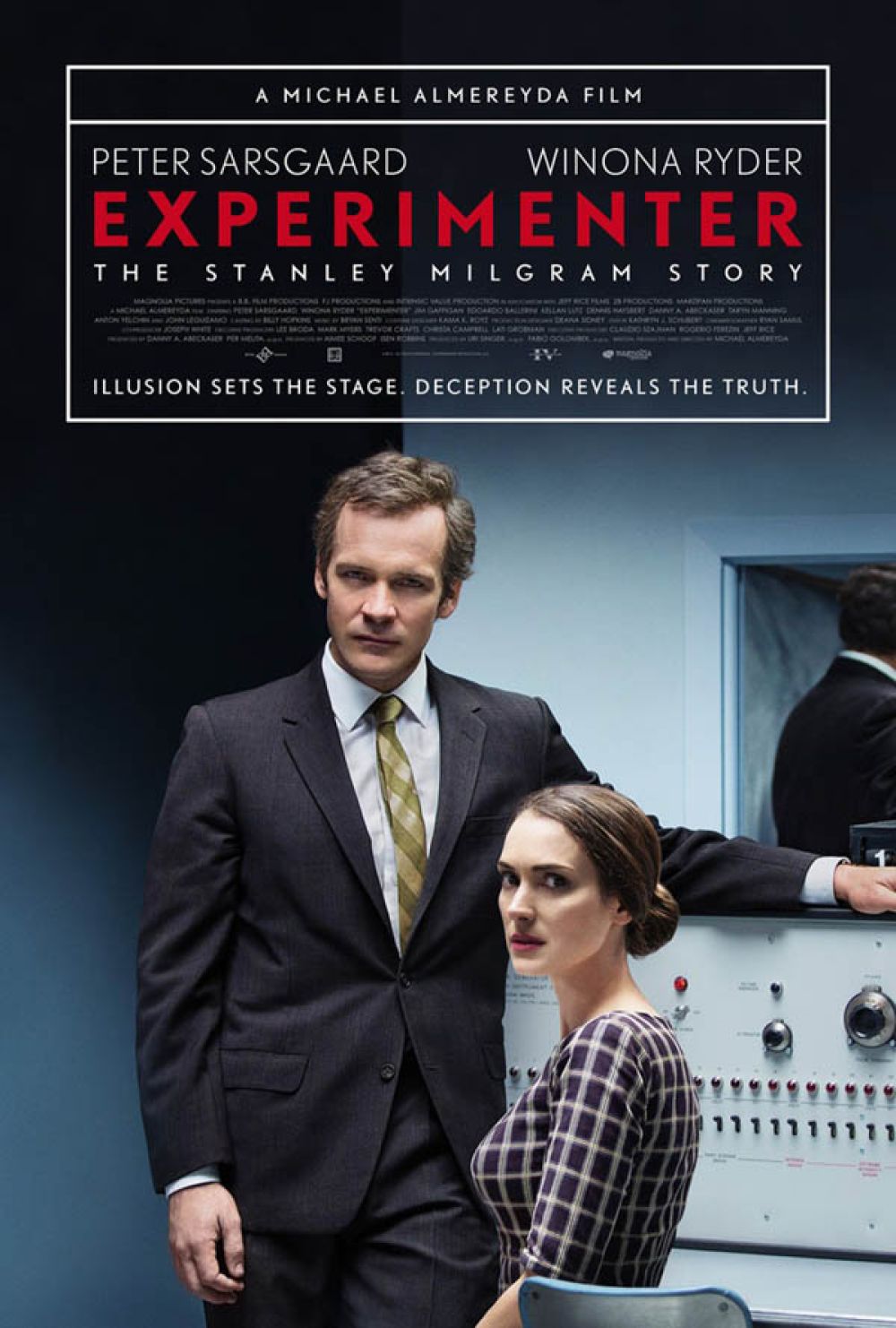'Experimenter' - Watch To Become A Better Person

People are sheep, and Stanley Milgram scientifically proved it. How could the Holocaust happen? How can there still be institutional racism?
And why it's going to happen again.
Experimenter is available for streaming on Netflix and is a biographical drama of the controversial social psychologist, Stanley Milgram. Staring Peter Sarsgaard as Milgram and Winona Ryder as his wife, along with notable actors making small appearances throughout, the Experimenter flew under the radar and was quietly released in October of 2015.
In the 1950s and 60s, minds were still fresh with what the Nazi’s had done in World War II. Former Nazi leadership that fled after the war were still being hunted down across the globe and being tried for warcrimes. The public was still learning of the atrocities as reports, photographs, and footage were still being released of concentration camps. The war wasn’t a distant memory and a young Jewish psychologist, Milgram—like most of the world—was curious as to how humanity could ever allow this to happen. How could an entire nation support mass killings? What would ever turn normal, decent humans—a baker, a mechanic, a school teacher—into a Nazi extermination force? Why would a rational, casual citizen standby and allow this cruelty to occur? Or worse, willingly participate in it?
In 1961, as an assistant professor at Yale, Milgram began his social experiments on obedience. Two at a time, he invited people from the street—all walks of life—to be in his experiment. At random, he dubbed one “The Learner” and the other as “The Teacher.” The Learner was sent to a different room and asked to memorize an impossible string of words. If The Learner made a mistake while answering The Teacher’s questions about the words, The Teacher would then administer an electric shook on The Learner. The voltage of the shock increasing with each incorrect answer.
The Teacher was told that the electric shocks caused The Learner no long term affects, however from the other room The Teacher could clearly hear that he was causing The Learner a great deal of pain. As the voltage increased, The Learner begged for mercy and pleaded through the walls for The Teacher to stop shocking him. The Teacher was told to continue the experiment and under no circumstance was he to stop. If a wrong answer was given, or The Learner was to stop answering, The Teacher was required to give a shock. Eventually, after reaching 450 volts, The Learner went quiet—seemingly dead from the electric shocks—yet The Teacher continued to zap from the lack of an answer.
What The Teacher didn’t know is that The Learner worked for Milgram—he was in on the experiment. There was actually no one being shocked in the other room, but the experiment was testing to see if normal people would inflict severe pain upon someone, to the point of seemingly death or unconsciousness, simply because someone in a lab coat told them to do so. The results provided an astounding yes. 65% of people continued to give shocks on the highest level, long after The Learner had riled in agony and dropped dead.
Most all of The Teachers exhibited some sort of hesitation, remorse, or concern with what they were doing in the moment. They knew without a doubt that they were inflicting severe pain, and they struggled with it. When they second guessed and questioned the lab technician if they should continue, they were given the stern order to follow through with the experiment. And they did. They continued to electrocute the man in the other room, simply because a person of seeming authority from some random experiment told them to do so. 20 minutes ago they were walking along on the sidewalk, now they had presumably just killed a stranger.
Experimenter highlights these test at Yale extremely well. It shows Milgram's lab, the process he used, his associates, and the various every-day people that carried out the experiment. Jim Gaffigan plays The Learner that gets electrocuted repeatedly and his gullible earnest sincerity plays perfectly with the period piece. John Leguizamo struggles to accept responsibility for his actions as The Teacher, most participants feeling extremely guilty and bad about themselves after the true nature of the experiment was revealed.
The movie follows Milgram’s life as a professor and the whirlwind that befalls him after the study is released. Winona Ryder does a good job as Milgram’s wife and later professional assistant. She’s a strong and believable character, but not overshadowing the purpose of the film.
The cinematography and writing is a bit unusual, but works well for this type of film. The meat and potatoes of the movie, the entire point, is obviously Milgram’s research. Peter Sarsgaard, playing Milgram, often looks directly into the camera and narrates his life. A green screen is used in a storybook fashion to bridge scenes or as the background to important events throughout. While this approach is odd, it’s not overly distracting and fits the intellectual or artistic narrative. It captures a mood, and while I’m sure it also cut production costs, it doesn’t seem hokey. It was a creative way to recreate a specific point in time, but relied solely on the experienced actors to carry it through. This technique would have fallen flat with weak acting.
Experimenter did a good job bringing this important research to a new generation or to those who have perhaps forgotten their Psych or Sociology 101 classes. You don’t need to be well versed or have a particular interest in the inner workings of the mind to appreciate the film. The research is important though. Everyone should watch it. They should make high schoolers watch it.
Even though the movie is a “Hollywood” take rather than a documentary, it still holds value. Not only may it help peak people’s interest in mental and social health, but it serves as a massive reminder—don’t go along with things you know aren’t right. Don’t blindly follow the masses or be swayed by social pressure for the sake of conformity. Question authority—but most importantly reject it when it isn't being just.











